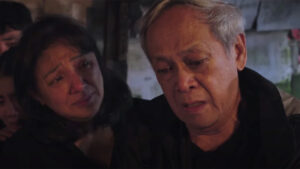Oras de Peligro: Hope for the flowers

Movie ReviewOras de PeligroDirected by Joel Lamangan
MOVIE director Joel Lamangan succeeds in bringing to life on the big screen, Boni Ilagan’s carefully crafted screenplay for Oras de Peligro. The film depicts events in the three days, from Feb. 22 to 24, 1986, before the first EDSA People Power Revolution.
This is their first cinematic collaboration for Bagong Siklab, a new movie production company which seeks to spark the blaze of truth that might dispel the dark distortions of our nation’s turbulent history. Bagong Siklab also strives to keep alive the fire of resistance and the determination to move our democracy forward, in the hearts of all Filipinos of good will.
Yes, such a fire still burns, not merely as embers in the hearts of the now elderly tibak (activists) of the fabled First Quarter Storm and its aftermath. The succeeding generations of X, Y, Z and millennials too, all animated by a healthy, rosy glow, made up over half of the audience which filled the UP Film Center during Oras de Peligro’s second premier on the eve of the 37th anniversary of the First People Power Revolution.
Mr. Ilagan and Mr. Lamangan have more than paid their dues, sacrificing their blood and personal liberty for love of our country. Both had been unjustly imprisoned and tortured for their political beliefs. Mr. Ilagan’s younger sister Rizalina was permanently “disappeared” in late July 1977. This tragedy did not silence him. Mr. Ilagan’s seminal 1977 play, Pagsambang Bayan, is dedicated to his desaparecida sister and to the other Southern Tagalog 10 activists. Mr. Lamangan was first imprisoned by the Marcos Martial Law Regime on Sept. 21, 1977, its 5th anniversary, and coincidentally, Mr. Lamangan’s 25th birthday. Both artists persist in speaking truth to power. The least we can do is to listen.
Oras de Peligro might be the tale of two widows: Corazon C. Aquino, the 1983 assassination of whose husband, Senator Benigno S. Aquino, sparked escalating nationwide protests culminating in the Feb. 25, 1986 People Power Revolution. The more mundane tragedy of the Marianas family plays out against this backdrop of larger events. Sub-plots, much like those slice of life illustrations by the late Larry Alcala, and documentary news footage give Oras de Peligro the texture of lived reality. The film’s sober purpose, which overrides any plot weaknesses and a sense of being overly contrived, is to teach factual history to those who only know distortions, lies, and fabrications.
On Feb. 22, a holdaper (thief)fatally stabs an elderly passenger on Dario Marianas’ (played by Allen Dizon) jeep. The old man openly carried nearly half a million pesos stuffed in a Manila envelope, apparently not having the sense to put that kind of cash in a secure case, or to have taken a taxi. The holdaper also stabs Dario. Serendipitously, Metrocom (short for the Philippine Constabulary Metropolitan Command) personnel, Sgt. Galido (Apollo Abraham) and Cpl. Cardema (Jim Pebanco) happen upon the scene of the crime, and summarily execute the holdaper. Ever pure-hearted, the wounded Dario entrusts the envelope of cash to the Metrocom, naively urging them to return this to the slain passenger’s family. That’ll be the day. The Metrocom promptly gun Dario down too.
A lone witness to the killings, Rita (Elora Espano) reveals the identities of Dario’s murderers to his son Jimmy (Dave Bornea). That is more than what the widow Corazon C. Aquino got, as 40 years later, the mastermind of Ninoy Aquino’s assassination is officially unidentified. Meanwhile, Dario’s widow Beatriz (Cherry Pie Picache) becomes the victim of further injustice, as her husband’s killers claim he was in cahoots with the holdaper. The Metrocom gain nothing by pinning the robbery on a dead man who will tell no tales, but it shows how these monsters are not just the law, but also above it. Rather than belaboring any legal niceties, the lesson here is of how little men with big guns and state-sanctioned power, can and do arbitrarily make ordinary people’s lives hell beyond death.
Having lost their padre de familia (head of the family), Beatriz is not about to surrender the last vestiges of honor remaining to her family, by having him posthumously accused of robbery. She protests against these false charges. The Metrocom tighten the screws by impounding Dario’s corpse in the morgue. Ms. Picache is poignantly heroic as a poor woman bravely standing up to the powerful who would tread upon her.
Desperation drives Dario’s teenage daughter Nerissa (Therese Malvar) to borrow money from her friend Carla’s (Krysten Dizon) sugar daddy Bembol (Allan Paule). She had earlier cringed at the thought of a man over thrice her age feasting on her friend’s booty, then is all outraged virtue when Bembol expects her to put out in exchange for his financial assistance. Why the bunso (youngest child) felt this fiscal responsibility was hers is puzzling, as Nerissa’s mother Beatriz is a maid for the bejeweled be-caftaned matrona Mam Jessa (Mae Paner), one of the Good Rich, as opposed to the Bad Rich like the DOM (dirty old man) Bembol. Mam Jessa just happened to be busy at EDSA with her amigas (friends). Albeit a bit belatedly, the good old feudal tradition benignly kicks in. Mam Jessa visits Dario’s wake and reminds Beatriz that all she has to do is ask.
At any rate, Nerissa’s nasty encounter with the lecherous Bembol illustrates how the economic morass engendered by Marcos Martial Law, made the term “prosti-tuition” part of our urban vernacular. It is also an opportunity for her brother Jimmy’s friend Yix (Timothy Castillo), to rescue Nerissa, and grab Bembol’s gun. Big bad Bembol doesn’t go after them with reinforcements to retrieve his gun, a lapse with significant consequences.
Earthly angels do appear along the Marianas family’s rocky road of sorrows. When Jimmy and Yix are scooped up by the Metrocom and dragged to jail, along with the strikers at a factory where they intended to apply for jobs, the labor union leader doesn’t denounce them as eskirol (scabs), but has their labor lawyer get the boys immediately released. Even among the Metrocom, Lt. Ruiz (Alvi Siongco, also one of the film’s producers) shows uncommon decency and level-headedness in dealing with the detainees. Noteworthy too is the hospital director Dr. Yumul who had attended to Yix’s student leader brother when injuries inflicted by the Metrocom in their violent dispersal of a rally, crippled him. Dr. Yumul intervenes in behalf of the Marianas Family, for the release of Dario’s remains. Another kind man in uniform gives Dario’s peasant leader father Ka Elyong (Nanding Josef) a ride to Manila so he can attend his son’s wake.
Oras de Peligro gives a balanced and comprehensive picture of that complex confluence of events which led to the first EDSA People Power Revolution. Among the memorable images then were of ordinary Filipinos from all walks of life, bravely approaching Marcos’ army, offering the soldiers refreshments and gently placing flowers in the barrels of their AK-47s. There was light in the darkness then, and there is still hope for the Philippines.
MTRCB Rating: R-13




